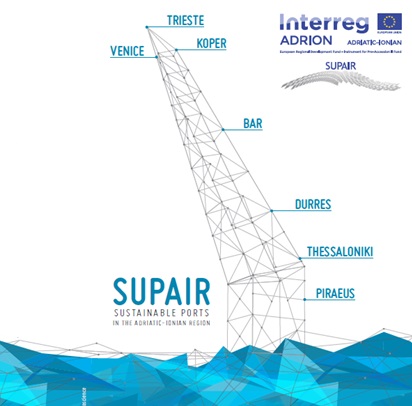Venice International University is one of the seven European partners involved in the European project
Nine steps to plan the development of a low-carbon port. These are defined by the “Guidelines for sustainable and low-carbon ports” drafted within the European project SUPAIR – SUstainable Ports in the Adriatic-Ionian Region, whose goal is to support port authorities in the development and implementation of local low-carbon action plans.
Funded by the Interreg Adrion V-B program with a budget of more than 1 million euro, the SUPAIR project aims at reducing the environmental impacts of shipping and on-shore port operations with an integrated approach and transnational perspective. To enhance port authorities’ capacity to plan and implement low-carbon and multimodal transport and mobility solutions on one side and to empower the main political, technical, trade stakeholders and partners in related decision-making on the other.
The final aim is the establishment of a Network of ADRION low-carbon ports engaged in developing soft and hard environment-friendly solutions addressed to developing a greener, safer and more efficient transport system.
The Venice International University (Italy) has issued the Guidelines with contributions coming from all project partners. The document consists in a common systematic framework with given structure and contents to support port authorities in the development and implementation of local low-carbon action plans.
Research work has capitalized on the best European experiences, through an extensive review of the most innovative practices currently existing on this topic, with a view to transferability and support to the project's partner ports. The activity has also incorporated the recent European and Italian regulatory indications in particular, enhancing the new elements of the reform of the port legislation.
The guidelines consider the interventions in the energy sector of ports, grouping them in three macro-areas of intervention: (1) reduction of energy consumption of vessels, (2) reduction of energy consumption of buildings and port facilities, (3) incentives in support of terminal operators who invest in less energy-intensive plants / equipment and / or renewable energy sources.
Using the Guidelines and taking into account the feedbacks received by the local stakeholders, the seven ports involved in the SUPAIR project are now working on their own Sustainable Action Plan.
The results achieved and the Action Plans produced within the project will be presented during the Mutual Learning Workshop that will be hosted by Area Science Park (Trieste – Italy) in November 2019. During such event, the Transnational Cooperation Network of Adriatic-Ionian Green Ports will be formally established and its enlargement promoted to new interested ports willing to embrace the SUPAIR approach and methodology.






















